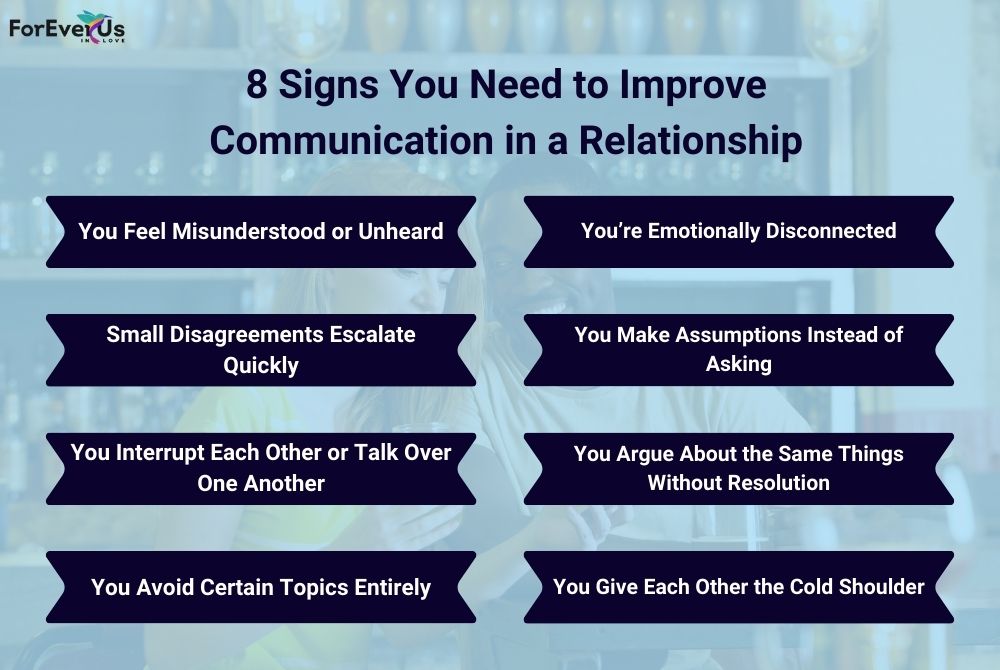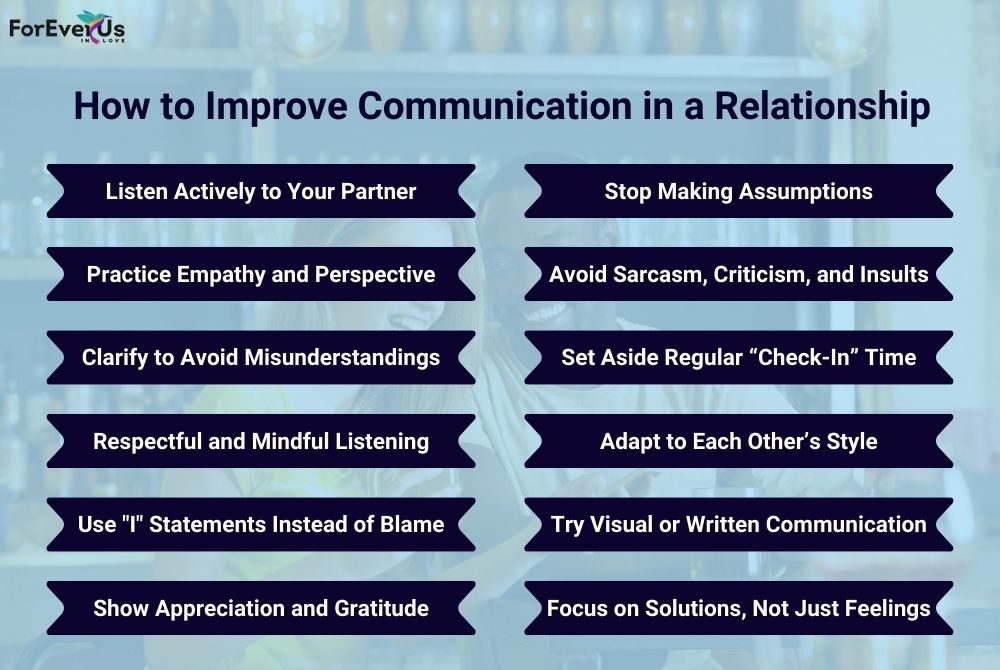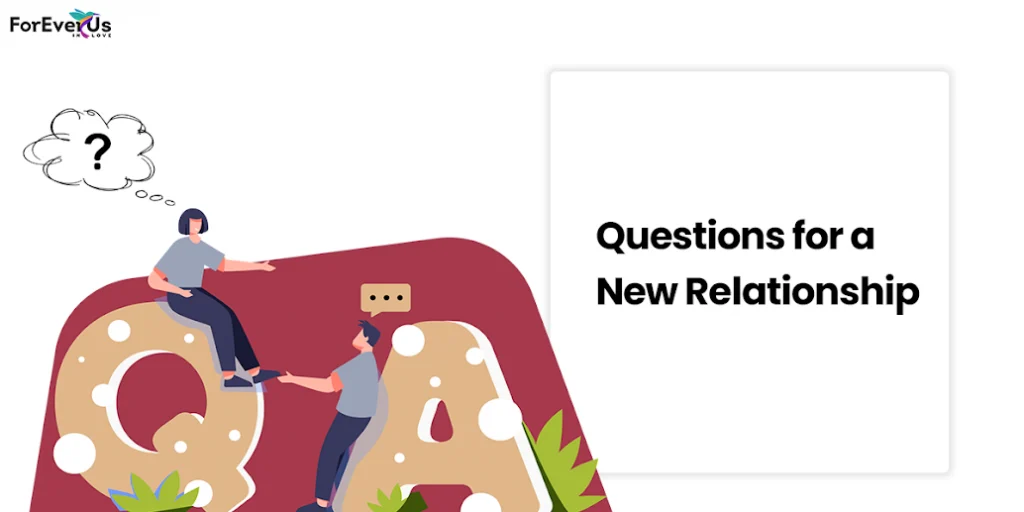Imagine this: You’re sitting across from your partner, wanting to share what’s on your mind. But somehow, the words just don’t land the way you meant them. They get defensive, you feel unheard, and now you’re in a loop of frustration. Sound familiar?
If you’ve ever felt like you and your partner are speaking different languages—even though you’re using the same words—you’re not alone. Communication breakdown is one of the most common (and damaging) issues in relationships. The good news? You can absolutely turn it around.
In this blog, we’ll explore how to improve communication in a relationship with real, actionable tips that go beyond generic advice. Whether you’re dating, married, or in a long-term partnership, these tips will help you reconnect, rebuild trust, and communicate in a way that brings you closer.
In a Hurry? Here Are 12 Proven Ways to Improve Communication in a Relationship
If you’re short on time, here’s a quick glance at the most effective communication tips:
- Listen actively and attentively – Put distractions aside and really focus.
- Practice empathy – Step into your partner’s shoes before reacting.
- Use reflective listening – Repeat what you heard to avoid misunderstandings.
- Avoid interrupting – Let each other speak without cutting in.
- Use “I” statements – Express your feelings without blaming.
- Show appreciation – Notice and acknowledge the little things.
- Ask, don’t assume – Curiosity builds connection; assumptions don’t.
- Avoid sarcasm and criticism – Be honest, but always kind.
- Schedule regular check-ins – Talk about your relationship intentionally.
- Learn each other’s communication styles – Adapt to how your partner communicates.
- Minimize tech distractions – Be fully present during important conversations.
- Regulate emotions during tough talks – Stay calm when conversations get heated.
Scroll down to dive deeper into each tip with real-life examples and how-tos!
Why Communication Matters in a Relationship
Communication isn’t just about talking—it’s about connecting. It’s about feeling seen, heard, and valued. The importance of strong communication lies in its ability to:
- Resolve conflicts without resentment
- Deepen emotional intimacy
- Build lasting trust
- Support each other through life’s ups and downs
Poor communication, on the other hand, can leave you feeling isolated—even when you’re together.
Let’s first figure out if miscommunication might be affecting your relationship.
8 Signs Communication Is Breaking Down in Your Relationship

1. You Feel Misunderstood or Unheard
No matter how clearly you think you’re speaking, your partner just doesn’t seem to get it. This constant disconnect creates frustration—and emotional walls.
2. Small Disagreements Escalate Quickly
What starts as a small issue spirals into a bigger argument. You’re not fighting about the dishes—you’re fighting because you don’t feel seen or respected.
3. You Interrupt Each Other or Talk Over One Another
Conversations turn into competitions instead of connections. It’s hard to feel heard when no one’s really listening.
4. You Avoid Certain Topics Entirely
You’d rather stay silent than start a fight, so important issues go unspoken. But silence doesn’t protect a relationship—it slowly breaks it down.
5. You’re Emotionally Disconnected
You talk logistics, not feelings. Conversations feel surface-level. It’s like you’re roommates—not romantic partners.
6. You Make Assumptions Instead of Asking
You “know” what they’re thinking… or do you? Assumptions often create problems that never existed.
7. You Argue About the Same Things Without Resolution
It’s like you’re stuck in a loop—same fight, different day. This means you’re not communicating effectively—you’re repeating old patterns.
8. You Give Each Other the Cold Shoulder
Silent treatment and emotional shutdowns replace open conversations. Without communication, resentment builds quietly but deeply.
If even one of these signs resonates with you, you’re not alone—and you’re not doomed. The good news? These patterns can be reversed. Let’s explore how to move from frustration to real connection.
12 Proven Tips on How to Improve Communication in a Relationship
These tips are not fluff. They’re grounded in psychology and real-life success stories and backed by relationship experts. And yes, they’re beginner-friendly too.

1. Listen Actively and Attentively
Communication starts with listening—not just hearing but truly listening. Put down your phone. Turn off distractions. Face your partner. Show you’re present.
Use eye contact, nod, and offer short verbal acknowledgments like, “I see” or “That makes sense.” Active listening makes your partner feel valued—and that alone can de-escalate conflict and increase emotional closeness.
2. Practice Empathy and Step Into Their Shoes
When you’re feeling frustrated, pause and ask yourself, “What might they be feeling right now?” Practicing empathy creates space for vulnerability. It helps you respond instead of react.
Empathy is the difference between arguing and understanding. Make it your secret weapon.
3. Clarify to Avoid Misunderstandings
Ever had an argument that spiraled from a simple misinterpretation?
Here’s a fix: Repeat back what your partner said using your own words.
Example: “So what I’m hearing is, you felt left out when I didn’t invite you to dinner with my friends?”
This technique—called reflective listening—ensures both of you are on the same page.
4. Avoid Interrupting and Talking Over Each Other
It’s natural to want to defend yourself when emotions run high. But, interrupting can shut down meaningful conversation.
Instead, pause. Breathe. Let your partner finish. You can still share your perspective—after they’ve shared theirs.
This small shift builds trust, reduces tension, and helps both of you feel respected.
5. Use "I" Statements Instead of Blame
There’s a world of difference between:
- “You never listen to me.”
- “I feel unheard when I’m speaking, and you’re on your phone.”
“I” statements express how you feel without attacking your partner. This is a game-changer for improving communication in a relationship.
When you take responsibility for your emotions, you create a safe space for open dialogue.
6. Show Appreciation and Gratitude
Communication isn’t just about fixing problems. It’s also about reinforcing what’s going right.
Say things like:
- “Thanks for making coffee this morning.”
- “I really appreciate how supportive you were this week.”
Gratitude softens the hard moments and strengthens emotional bonds.
7. Stop Making Assumptions
When we’re emotionally close to someone, it’s easy to think we know what they’re feeling. But assuming is risky.
Instead, ask:
- “How are you feeling about that?”
- “Is there something you wish I understood better?”
Curiosity builds connection. Assumptions build walls.
8. Avoid Sarcasm, Criticism, and Insults
Sarcasm may seem harmless, but it often masks frustration or hurt—and it can feel passive-aggressive to your partner.
Direct criticism or insults? Even worse. They create emotional scars that are hard to heal.
Speak from kindness. Even when discussing tough topics, aim for honesty without harm. If it’s not constructive, it’s destructive.
If even one of these signs resonates with you, you’re not alone—and you’re not doomed. The good news? These patterns can be reversed. Let’s explore how to move from frustration to real connection.
9. Set Aside Regular “Check-In” Time
Life gets busy—and meaningful conversations get buried under daily routines. That’s why scheduling regular check-ins can be a relationship game-changer.
Set aside 15–30 minutes a week to sit down, no phones and no distractions—just the two of you. Talk about how you’re both feeling, what’s been stressing you out, or what’s going well.
Think of it as emotional maintenance—just like brushing your teeth, but for your relationship.
If even one of these signs resonates with you, you’re not alone—and you’re not doomed. The good news? These patterns can be reversed. Let’s explore how to move from frustration to real connection.
10. Learn and Use Each Other’s Communication Styles
Everyone communicates differently. Some people need time to think before responding. Others prefer to talk things out immediately. Some are direct; others are more emotional or indirect.
Learning your partner’s style—and helping them understand yours—reduces friction and increases understanding.
Try saying:
“Hey, I notice you need space after an argument. Let’s talk once you’re ready—I just want to stay connected.”
Understanding this can prevent so many unnecessary fights.
If even one of these signs resonates with you, you’re not alone—and you’re not doomed. The good news? These patterns can be reversed. Let’s explore how to move from frustration to real connection.
11. Use Visual or Written Communication When Emotions Run High
If a topic feels too charged for a face-to-face talk, write it out. A thoughtful text or note can give both of you space to process the situation without the heat of the moment taking over.
Some couples even use shared journals to write down thoughts, feelings, or things they appreciate about one another. It might sound old-school—but it works.
This gives emotional conversations a softer landing.
12. Focus on Solutions, Not Just Feelings
While validating emotions is key, staying stuck in blame or venting can stall communication. A powerful shift happens when both of you move the focus from what went wrong to what we can do better next time.
Example:
- Instead of: “You never make time for me.”
- Try: “I miss spending time with you. Could we plan a date night this week?”
Solution-focused communication keeps things productive and forward-moving—even during conflict.
You might already be doing some of these things—and that’s a great start. But what if things still feel off?
What If You Still Struggle with Communication?
First, give yourself credit. The fact that you’re reading this shows you’re committed to growth.
If you’ve tried these tips and communication is still difficult, consider:
- Reading books like “Nonviolent Communication” by Marshall Rosenberg
- Seeking couples counseling or coaching
- Using relationship apps like ForeverUsInLove that encourage open conversations
Growth doesn’t happen overnight—but every healthy exchange moves you forward.
Conclusion
Healthy communication isn’t a one-time fix. It’s a daily practice. But the rewards? Huge.
You’ll:
- Argue less and connect more
- Build trust and intimacy
- Feel like true teammates in life
By following these 12 proven ways to improve communication in a relationship, you’ll set the foundation for a love that’s not just lasting—but thriving.
So next time things feel tense, pause and ask: “What does my partner need right now? And how can I listen better?”
You’ve got this.
FAQs
What causes poor communication in a relationship?
Poor communication is often caused by unresolved emotional issues, assumptions, lack of listening, unspoken expectations, or even daily stress. Recognizing these root causes is the first step to improving your connection.
Can communication in a relationship really be fixed?
Yes, communication can absolutely be improved with consistent effort, empathy, and the right tools. Even couples who’ve struggled for years can rebuild trust and clarity with the right approach.
How do you communicate with a partner who shuts down?
Start by creating a safe, non-judgmental space. Use gentle “I” statements, avoid criticism, and ask open-ended questions like, “What would help you feel more comfortable talking right now?”
What should I do if my partner refuses to communicate?
Focus on what you can control—your own communication. Be open, patient, and consistent. If the issue persists, couples counseling or guided relationship insights can offer support.












